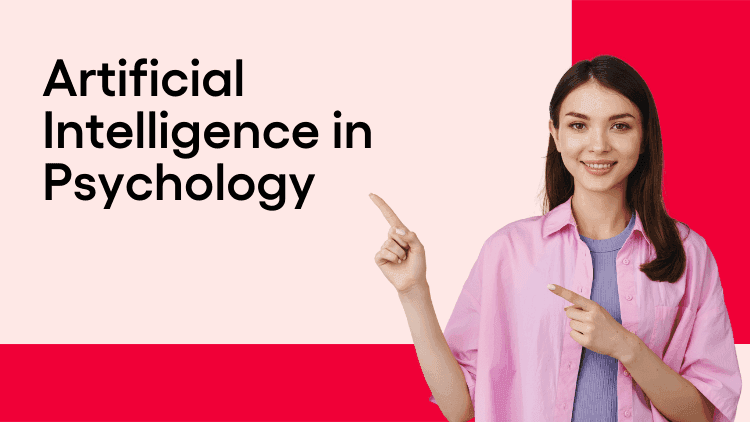In a world driven by technological advancements, the realms of science and the intricacies of the human mind have converged in an unprecedented way. Enter the fascinating domain of Artificial Intelligence in psychology, where the marriage of data-driven analysis and cognitive understanding is reshaping how we perceive and treat mental health issues. It's a subtle blend of algorithms and emotions, of lines of code and the enigmatic workings of the human psyche. In this blog, we embark on a journey to explore how AI is revolutionizing the field of psychology in AI from diagnostics and therapy to research and beyond.
What is Artificial Intelligence in Psychology?
The human mind, a labyrinth of thoughts, emotions, and behaviors, has long intrigued psychologists and researchers. Delving into its complexities requires a multifaceted approach that traditional methods sometimes struggle to provide. This is where Artificial Intelligence steps in, armed with its prowess in processing vast amounts of data and identifying patterns that elude human analysis.
Imagine a scenario where a person's online interactions, social media posts, and even linguistic nuances in conversations could be analyzed to provide insights into their mental well-being. AI-driven sentiment analysis and language processing tools can gauge emotional states, potentially acting as an early warning system for conditions like depression or anxiety. This data-driven approach, while not a definitive diagnosis, presents an exciting opportunity for mental health professionals to intervene early and offer support.
Therapy in the Digital Age - Advantages of AI
Therapeutic sessions with AI-powered chatbots might sound like a plot from a sci-fi novel, but they are very much a reality today. With the stigma often attached to seeking psychological help, chatbots provide a non-judgmental and accessible platform for individuals to express their thoughts and feelings. These AI companions use Natural Language Processing to engage in conversations, offering empathy, coping strategies, and resources for managing stress and anxiety.
It's important to note that while these chatbots can offer valuable support, they are not a replacement for human therapists. Instead, they serve as a supplementary tool, offering assistance between sessions or acting as a bridge for those hesitant to engage with traditional therapy. As technology evolves, we find ourselves at the crossroads of ethical considerations – how much responsibility can we entrust to machines when it comes to matters of mental well-being?
Applications of AI: AI and Neuroimaging
Artificial Intelligence Engineering - Neuroimaging, a powerful tool for understanding the brain's inner workings, has received a significant boost from AI. Analyzing complex brain scans and mapping them to psychological conditions is a task that demands precision and efficiency – qualities AI possesses in abundance. Machine learning algorithms can sift through volumes of neuroimaging data to identify subtle anomalies that might indicate disorders like schizophrenia or Alzheimer's disease.
Moreover, AI has facilitated the development of Brain-Computer Interfaces (BCIs), allowing direct communication between the brain and external devices. While initially intended for individuals with physical disabilities, BCIs have shown potential in aiding those with locked-in syndrome and severe communication impairments. These innovations not only offer new avenues for research but also hold the promise of groundbreaking interventions in the field of cognitive psychology.
Ethics and the Human Touch
As AI continues its incursion into the domain of Artificial Intelligence in cognitive psychology, ethical concerns come to the forefront. The nature of mental health treatment is deeply rooted in human empathy, understanding, and connection. Can machines replicate these qualities? The debate rages on, raising questions about patient privacy, the authenticity of therapeutic relationships, and the potential for AI to perpetuate biases present in the data it learns from.
Striking the right balance between technological advancement and ethical considerations is imperative. While AI can undoubtedly expedite processes and provide invaluable insights, it must always be seen as a tool wielded by trained professionals rather than a replacement for the nuances of human interaction.
Check out the latest guide on "Data Science in Mental Health"
The Road Ahead: Collaboration between Man and Machine
The synergy between AI and psychology is a testament to human innovation and our ceaseless quest to unravel the mysteries within and around us. As AI algorithms become more sophisticated and capable of understanding emotions, nuances, and humor, the collaboration between humans and machines holds immense potential.
In the coming years, we might witness AI-powered virtual therapists who provide evidence-based interventions and adapt their approaches based on real-time patient feedback. Artificial Intelligence and psychology could aid in personalizing treatment plans, predicting relapses, and fine-tuning therapeutic strategies. However, the essence of psychology and Artificial Intelligence – the art of understanding human emotions and providing genuine empathy – must remain at the core of any therapeutic endeavor.
Read our latest blog on "Artificial Intelligence Stocks in India".
Conclusion
Artificial Intelligence psychology is not about replacing human insight; it's about enhancing our understanding and capabilities. The fusion of data-driven analysis and emotional understanding creates a dynamic landscape where technology complements the human touch. From early detection of mental health concerns to innovative therapeutic tools, AI in psychology is charting new territories, reminding us that the most potent solutions often arise from the harmonious interplay of the human mind and the capabilities we create. As we move forward, the ethical compass guiding this journey will be as crucial as the algorithms themselves.


